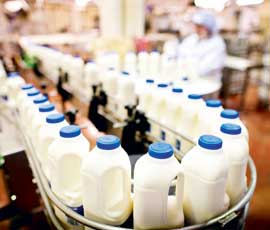‘Dairies must pay 35p/litre to secure supplies’

Dairy processors need to pay at least 35p/litre to secure milk supplies this summer, The Dairy Group has warned.
Although UK farmgate milk prices have recently risen on the back of improved global commodity markets (see box below), further increases are needed to offset higher production costs, which have now reach an average of 34p/litre.
In the past three weeks, European dairy markets had increased by 7-8%, while southern hemisphere prices were up 30%, said consultant Nick Holt-Martyn of The Dairy Group.
Further UK price rises were on the way, but the UK market was typically slow to react to commodity markets due to its focus on core products such as liquid milk and cheese, he added.
| Milk price rises |
|---|
• Co-op aligned producers received a 0.35p/litre price increase on Monday (22 April), bringing the standard litre price up to 31.85p/litre. • Arla Milk Link members will get a 1.06p/litre increase from 29 April, to 30.21p/litre. • Dairy Crest will increase the price it pays the 600 producers on its standard liquid contract by 1.5p/litre from 1 June – the standard litre price will be 31.5p/litre. • Dairy Crest also announced an enhanced volume incentive for all liquid producers. Taking the 2012-12 milk year as its base line, producers who meet at least 2% volume growth will receive an extra 2p/litre on all litres produced above the base year. |
“Globally there is a shortage of milk, and there is a commodity boom taking place in the southern hemisphere. If the price goes up in one part of the world, it has to go up in another part of the world,” he said.
“Milk prices are going to rise this year, but as is often the case, they don’t rise in response to [production] costs, but in response to market pressures.”
The only way processors would secure extra milk was by paying for it, he said.
“Economics is the single biggest driver for milk production – if these companies really want milk, stick 35p/litre on the table. If you pay for it, you will get it,” he said.
NFU chief dairy adviser Luke Ryder said: “We do now expect all milk buyers to follow suit with similar price rises.”
Cheese shortage on horizon
Producers supplying cheese contracts were unlikely to see improved prices before May or June, warned Mr Holt-Martyn.
He said it would be “criminal” for retailers not to return more of their gross margin down the supply chain to farmers, and warned a cheese shortage was on the horizon as processors moved milk into more lucrative products such as skimmed milk powder and curd.
Recently First Milk admitted a price cut was on the cards unless retailers paid more for cheese, sparking farmer protests at retailer depots across the country.
On Wednesday (24 April) the processor said it had held “positive discussions” with Asda, Morrisons and the Co-operative about returns for cheese.
| Feed costs wipe margins |
|---|
| The effect of higher winter feed costs shows clearly in the latest Dairy Group MCi results to the end of January, where £34,000 has been wiped off the average herd margin over purchased feed (MOPF) in just four months. If MOPF falls, profits will fall too, warns director Ian Powell. “The situation is actually much worse, as this margin does not factor in the decline in forage stocks, which will add to the loss.” At 10p/litre, purchased feed cost was 25% higher in January this year than in 2012 for the average 197-cow herd costed. |
Dairy Crest ups price and volume incentive
